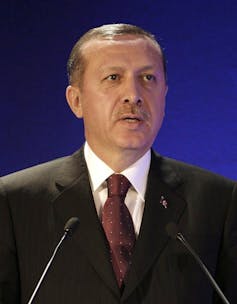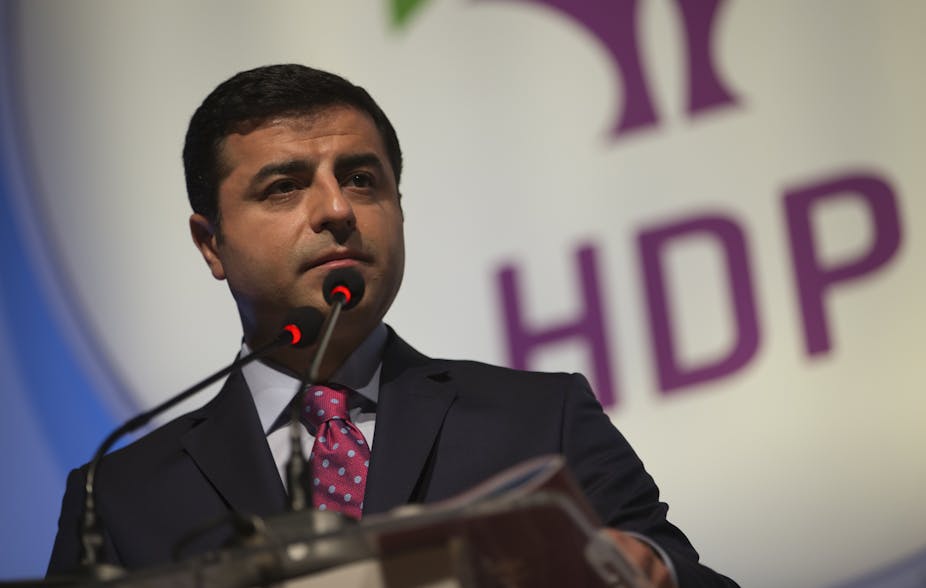Turkey’s social and political scene has long been subject to polarisation, protests and police investigations. Many expected the atmosphere of confusion to evaporate after last year’s presidential election was won by former prime minister Recep Tayyip Erdoğan. But as the country prepares for its general election ten months on, doubt still persists.
This election represents a fork in the road for Turkey. Which path the nation follows will rest on the success or failure of the pro-Kurdish, left-leaning People’s Democracy Party (HDP). A recent report by the Research Institute on Turkey – which relies on quantitative analysis of election surveys – showed that the outcome for the HDP in this election will have a greater impact on the future of Turkish politics than any other factor.
Taking a risk
The HDP is the political wing of the People’s Democratic Congress. The congress is an organisation with members from a range of left-wing movements, including trade unions, NGOs and smaller political parties. There are currently 35 deputies in the Turkish parliament, who were fielded as independent candidates by the People’s Democratic Congress to get around Turkey’s electoral threshold. The threshold requires that political parties win 10% of the vote before their representatives can take up seats in the parliament.
This election, the People’s Democratic Congress has made the bold decision to field 550 candidates from the HDP. This means the party will need to meet the threshold, or forfeit its seats. The HDP is pursuing a leftist, pro-minority rights agenda, and tackling topics such as the Armenian genocide, LGBT rights, conscientious objection and the status of the Diyanet (the body that administers religious affairs), which have traditionally been taboo in Turkey.
If the HDP does not pass the threshold, Turkey will enter a turbulent and highly uncertain period. The Justice and Development Party (AKP) – founded by president Erdoğan, and led by him for over a decade – is likely to gain enough seats to call a referendum on whether to hand over greater executive powers to the president. This could accomplish Erdoğan’s goal of transforming the presidency from a largely ceremonial role into one which enables him to control parliamentary, executive and legislative systems.

But if the HDP does pass the threshold – winning between 800,000 and 1.2 million more votes than the independent candidates did last election – it could gain about 60 seats in the parliament. Since the HDP opposes giving more powers to the president, the parliamentary arithmetic suggests that if the HDP overcomes the threshold, Erdoğan’s presidential reforms will not pass.
Having the HDP in parliament would bring about three positive developments. After many years of mainstream politics, the Turkish parliament would have representatives from right across the political spectrum: the HDP is fielding a range of communist, socialist, Marxist, Muslim, non-Muslim and feminist candidates. What’s more, the ongoing Kurdish peace talks – which are being mediated by the HDP – would become a priority.
HDP co-leader Selahattin Demirtaş would be a new voice for freedom and for the interests of minority groups/. This is what Turkey urgently needs, as the AKP and Erdoğan continue to use polarising language, which risks deepening existing rifts between different religious and ethnic groups within Turkish society.
A fair fight?
It is doubtful that all political parties are running their election campaigns under equal conditions. This was also a concern during the presidential elections of August 2014. It is well known that opposition parties are not allocated the same time or space as the AKP to make their case to the people.
President Erdoğan is extremely aggressive against media outlets that criticise the government. The Council of Europe has issued a warning about media bias during the Turkish elections, and news agencies such as Reuters have even described it as a war on critical media.
The HDP is also stigmatised by the ruling AKP party. Even Erdoğan – who, as president, is supposed to remain neutral – has made speeches criticising the HDP for allegedly supporting terrorism, developing agendas that threaten national interest and promoting LGBT candidates. The HDP’s buildings and stands have been attacked more than 70 times over the past few months. Some suggest that the attacks were the result of systematic propaganda against the HDP.
HDP buildings were bombed in Mersin and Adana. In a democratic country, one would expect this kind of political violence to cause a public uproar, but in Turkey it has become routine.
Mustering support
Despite these challenges, the HDP has been gaining ever-greater support from Kurdish voters, minority groups, the Turkish and Kurdish diasporas and other voters who are disillusioned with mainstream politics. The HDP is commonly referred to as a “Kurdish party”, and has its roots in the Kurdish nationalist movement. It promises a more legitimate peace process; one that includes elected representatives in parliament who can raise Kurdish concerns. But the HDP is also the only political party which represents such a wide range of groups, which have been consistently overlooked by the mainstream parties.
The HDP is also running a campaign abroad. After the 2014 presidential election, the party adopted a transnational strategy, in an effort to appeal to potential voters from Turkish and Kurdish diasporas. This is now possible due to changes in voting regulations. After demanding the right to vote outside of Turkey for the last three decades, Turkish expatriates were finally able to vote from their countries of residence for the first time in the 2014 presidential election. Although the ballot boxes were only open at customs offices, these changes have transformed election campaigns into international affairs.
It is estimated that there are around two million Kurds in the diaspora; these include economic migrants, asylum seekers and political refugees. There are also members of Turkish leftist groups and Alevi muslims abroad, whose numbers are estimated to be in the millions. Oppressed and deprived of equal rights in Turkey, these groups have great potential for the HDP as a voter base.
The diaspora vote had a lower turnout than expected for the presidential elections in 2014: the reason behind this is that many voters thought that the results of the election were a foregone conclusion. But with every vote needed to get the HDP past the 10% threshold, the diaspora may have had greater motivation to mobilise this time around. Diaspora voting ended on May 31.
It seems the HDP’s “new life” theme can appeal to a people of different ideologies, across the political spectrum. Ultimately, the HDP’s performance in this election will have major consequences for Turkey. If it passes the threshold, Turkey will not become a beacon of democracy and social justice overnight. But it will have a more colourful opposition, emboldened and ready to take the country in a new direction.

